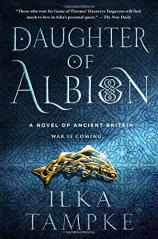Daughter of Albion: A Novel of Ancient Britain
Review
Daughter of Albion: A Novel of Ancient Britain
Debut author Ilka Tampke visits Ancient Britain and the Roman invasion in DAUGHTER OF ALBION. Though this historical fantasy features an engaging romance, it ultimately proves lackluster when Tampke tries too hard to make mysticism happen.
Meet Ailia, a teenager living in pre-Roman Britain in the peaceful land of Summer. Although beloved by her foster mother, orphaned Ailia is an outcast from her tribe because she lacks skin, an animal totem granted to a child by his or her parents. As a result, she can never marry and, perhaps more importantly, learn any of the magical knowledge taught by the journeymen, the tribe’s wisepeople (Druids). Like every teen, Ailia begins to defy societal conventions, striking out on her own to learn the ways of the Mothers --- tribal ancestors and goddesses --- despite her lack of skin. In the process, she falls head over heels into a magical world she never expected to uncover.
"Where Tampke makes the magical element work comes in the compelling, Romeo and Juliet-style romance between Ailia and a mysterious youth named Taliesin."
While Tampke attempts to make DAUGHTER OF ALBION a successor to the works of Marion Zimmer Bradley, Diana L. Paxson and Rosalind Miles, she doesn’t succeed on that front. Tampke demonstrates little of the deftness with which her predecessors interwove elements of spirituality and magic into a well-constructed narrative. The ins and outs of tribal magic are confusing, Ailia’s powers hard to understand, the name of the tribe’s prophetess --- the “Kendra” --- implausible and far too modern. Where Tampke makes the magical element work comes in the compelling, Romeo and Juliet-style romance between Ailia and a mysterious youth named Taliesin. Their love transcends earthly and spiritual realms, and readers can feel that bond, snug and secure, throughout the story.
For history buffs and British fiction fans alike, Tampke’s word choice is confusing. There are notable errors --- misspellings of the names of British tribes and the Roman Vestal Virgins --- and unnecessary additions to the canon of Celtic mythology. For example, the idea of “skin” was unceremoniously plucked from its rich roots in aboriginal Australian mythology and plopped into a foreign environment in a way that didn’t gel for this reviewer. Similarly, for no seemingly good reason, the Druids are given a new name, that of journeymen (easily confused with the word referring to trained workers).
Despite the well-built tendrils of romance that snake throughout DAUGHTER OF ALBION, its ill-constructed foundations don’t redeem the story. Those looking for a compelling tale of Roman interactions with Celtic culture should pick up Morgan Llywelyn’s DRUIDS.
Reviewed by Carly Silver on May 6, 2016
Daughter of Albion: A Novel of Ancient Britain
- Publication Date: April 19, 2016
- Genres: Fantasy, Fiction, Historical Fantasy, Historical Fiction
- Hardcover: 368 pages
- Publisher: Thomas Dunne Books
- ISBN-10: 1250081092
- ISBN-13: 9781250081094





